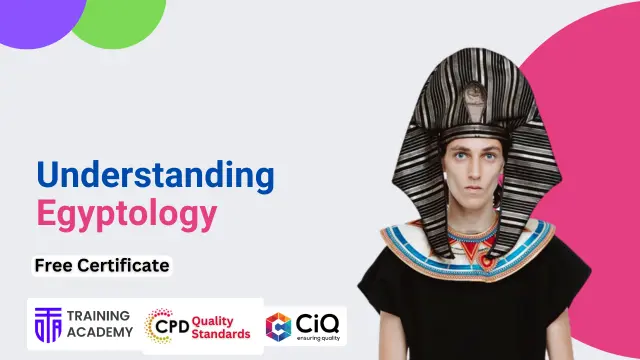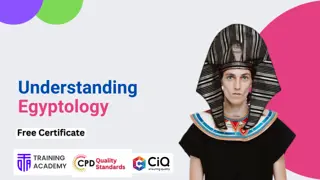
Understanding Egyptology
CPD Accredited ! Free Certification | FREE Retake Exam | Lifetime Access | No Hidden Fees
Online Training Academy
Summary
- Digital certificate - Free
- Reed Courses Certificate of Completion - Free
- Tutor is available to students
Add to basket or enquire
Overview
Are you fascinated by the enigmatic allure of Ancient Egypt? Dive into the world of pharaohs, pyramids, and hieroglyphs with our captivating course, "Understanding Egyptology". Unravel the secrets of one of the world's most intriguing civilizations through nine immersive modules designed to take you on an unforgettable journey through time.
Key Features:
- CPD Certified
- Free Certificate from Reed
- CIQ Approved
- Developed by Specialist
- Lifetime Access
Certificates
Digital certificate
Digital certificate - Included
Reed Courses Certificate of Completion
Digital certificate - Included
Will be downloadable when all lectures have been completed.
CPD
Curriculum
Course media
Description
In this course, students will explore the fascinating world of ancient Egypt. They will start by understanding the basics of Egyptology, including its history and significance. They will delve into the language, writing, and numeral system of ancient Egypt, gaining insight into how communication and record-keeping were conducted. Students will learn about daily life in ancient Egypt, covering topics such as social structure, family life, and occupations. They will also study the dynasties that ruled ancient Egypt and the key figures that shaped its history. Exploring the rich mythology, students will discover the gods and goddesses worshipped by the ancient Egyptians and their significance. The course will also delve into the governance and society of ancient Egypt, examining the role of pharaohs and the structure of government. Additionally, students will learn about trade, military force, art, and architecture, gaining a comprehensive understanding of the civilization's cultural and socio-political aspects.
Course Curriculum
- Module 01: Introduction to Egyptology
- Module 02: Language, Writing and Numeral System
- Module 03: Living in Ancient Egypt
- Module 04: The Dynasties of Ancient Egypt
- Module 05: Gods and Goddesses
- Module 06: Pharaoh, Government and Society
- Module 07: Trade and Military Force of Ancient Egypt
- Module 08: Art of Ancient Egypt
- Module 09: Architecture of Ancient Egypt
Learning Outcomes:
- Identify key features of ancient Egyptian culture and civilization.
- Understand the Egyptian language, writing system, and numeral system.
- Describe the daily life, customs, and traditions of ancient Egyptians.
- Analyze the chronological development of ancient Egyptian dynasties.
- Explain the roles and significance of gods and goddesses in Egypt.
- Evaluate the political, social, and religious structures of ancient Egypt.
Who is this course for?
- History enthusiasts seeking in-depth knowledge of ancient Egypt.
- Students of archaeology and anthropology interested in ancient civilizations.
- Art historians exploring the art and architecture of ancient cultures.
- Scholars of religious studies focusing on ancient Egyptian beliefs.
- Educators looking to enrich their teaching with Egyptology insights.
Career path
- Museum Curator
- Archaeological Researcher
- Egyptology Lecturer
- Historical Consultant
- Cultural Heritage Manager
- Artifacts Conservator
Questions and answers
Currently there are no Q&As for this course. Be the first to ask a question.
Reviews
Currently there are no reviews for this course. Be the first to leave a review.
Legal information
This course is advertised on reed.co.uk by the Course Provider, whose terms and conditions apply. Purchases are made directly from the Course Provider, and as such, content and materials are supplied by the Course Provider directly. Reed is acting as agent and not reseller in relation to this course. Reed's only responsibility is to facilitate your payment for the course. It is your responsibility to review and agree to the Course Provider's terms and conditions and satisfy yourself as to the suitability of the course you intend to purchase. Reed will not have any responsibility for the content of the course and/or associated materials.


